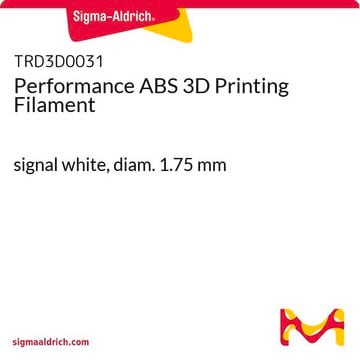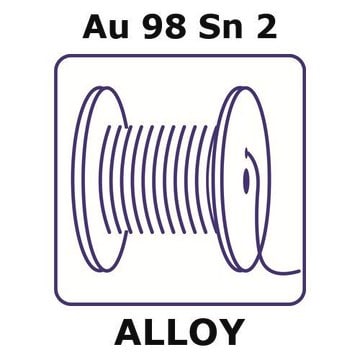GF44189242
Tin
wire reel, 1m, diameter 0.25mm, as drawn, 99.99+%
Synonyme(s) :
Tin, SN005110
Se connecterpour consulter vos tarifs contractuels et ceux de votre entreprise/organisme
About This Item
Formule empirique (notation de Hill):
Sn
Numéro CAS:
Poids moléculaire :
118.71
Numéro MDL:
Code UNSPSC :
12141745
ID de substance PubChem :
Nomenclature NACRES :
NA.23
Produits recommandés
Pureté
99.99%
Forme
wire
Fabricant/nom de marque
Goodfellow 441-892-42
Résistivité
11 μΩ-cm, 20°C
L × diam.
1 m × 0.25 mm
Point d'ébullition
2270 °C (lit.)
Pf
231.9 °C (lit.)
Densité
7.310 g/mL at 25 °C (lit.)
Chaîne SMILES
[Sn]
InChI
1S/Sn
Clé InChI
ATJFFYVFTNAWJD-UHFFFAOYSA-N
Description générale
For updated SDS information please visit www.goodfellow.com.
Informations légales
Product of Goodfellow
Certificats d'analyse (COA)
Recherchez un Certificats d'analyse (COA) en saisissant le numéro de lot du produit. Les numéros de lot figurent sur l'étiquette du produit après les mots "Lot" ou "Batch".
Déjà en possession de ce produit ?
Retrouvez la documentation relative aux produits que vous avez récemment achetés dans la Bibliothèque de documents.
Gabriel Santpere et al.
Genome biology and evolution, 7(6), 1490-1505 (2015-05-16)
We set out to investigate potential differences and similarities between the selective forces acting upon the coding and noncoding regions of five different sets of genes defined according to functional and evolutionary criteria: 1) two reference gene sets presenting accelerated
Mutagens and potential mutagens in the biosphere. II. Metals--mercury, lead, cadmium and tin.
L Fishbein
The Science of the total environment, 2(4), 341-371 (1974-07-01)
Are nickel, vanadium, silicon, fluorine, and tin essential for man? A review.
F H Nielsen et al.
The American journal of clinical nutrition, 27(5), 515-520 (1974-05-01)
S G Schäfer et al.
Regulatory toxicology and pharmacology : RTP, 4(1), 57-69 (1984-03-01)
A tolerable limit for tin concentration in canned food of 250 ppm (Fritsch et al., 1977) is generally accepted. However, biochemical effects attributable to tin have been observed even after oral administration of 1 and 3 mg Sn/kg body wt
M R Krigman et al.
Neurotoxicology, 5(2), 129-139 (1984-01-01)
The toxicology of tin is almost entirely the toxicology of the organic compounds of tin, for the metal itself and its inorganic compounds appear to be nearly harmless for practical purposes. Furthermore, the neurotoxicity of organotin is essentially that of
Notre équipe de scientifiques dispose d'une expérience dans tous les secteurs de la recherche, notamment en sciences de la vie, science des matériaux, synthèse chimique, chromatographie, analyse et dans de nombreux autres domaines..
Contacter notre Service technique





